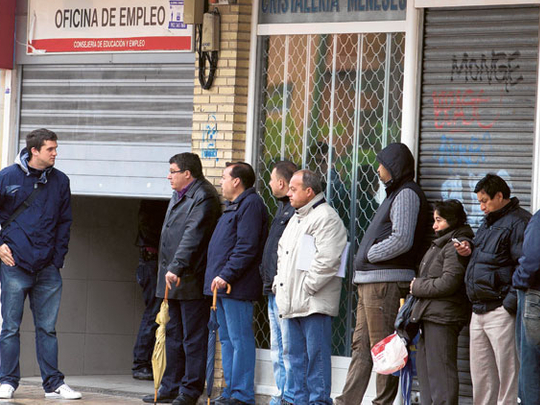
London The 17 countries that use the euro are facing the highest unemployment rates in the history of the currency as recession once again spreads across Europe, pressuring leaders to focus less on austerity and more on stimulating growth.
Unemployment in the Eurozone rose by 169,000 in March, official figures showed on Wednesday, taking the rate up to 10.9 per cent — its highest level since the euro was launched in 1999.
The seasonally adjusted rate was up from 10.8 per cent in February and 9.9 per cent a year ago and contrasts sharply with the picture in the US, where unemployment has fallen from 9.1 per cent in August to 8.2 per cent in March.
Spain had the highest rate in the Eurozone, 24.1 per cent — and an alarming 51.1 per cent for people under 25.
Austerity has been the main prescription across Europe for dealing with a debt crisis that's afflicted the continent for nearly three years and has raised the spectre of the break-up of the single currency. Three countries — Greece, Ireland and Portugal — have already required bailouts because of unsustainable levels of debt.
Eight Eurozone countries, including Greece, Spain and the Netherlands, have seen their economies shrink for two straight quarters or more, the common definition of a recession.
Deeply flawed strategy
Economies are contracting across the Eurozone as governments cut spending and raise taxes to reduce deficits. That has prompted economists to urge European Union policymakers to dial back on short-term budget-cutting and focus on stimulating long-term growth.
"The question is how long EU leaders will continue to pursue a deeply flawed strategy in the face of mounting evidence that this is leading us to social, economic and political disaster," said Sony Kapoor, managing director of Re-Define, an economic think-tank and policy advisory company.
In a nod to shifting attitudes about austerity, European Central Bank president Mario Draghi recently called for a "growth pact" in Europe to work alongside the "fiscal pact" that has placed so much importance on controlling government spending.
Bailout fears have intensified in recent months as Spain, Italy and other governments face rising borrowing costs on bond markets, a sign that investors are nervous about the size of their debts relative to their economic output. Austerity is intended to address this nervousness by reducing a government's borrowing needs, but there has been a negative side effect: As economic output shrinks, the debt burden actually looks worse.
Pro-growth measures
Economists recommend pro-growth measures including reducing red tape for small businesses, making it easier for workers to find jobs across the Eurozone and breaking down barriers that countries have created to protect their own industries. Some economists go a step further and say governments should actually increase spending while economies are so weak — and make reining in deficits a longer-term goal.
The central bank has tried to reinvigorate Eur-ope's financial system by lowering interest rates and extending $1.3 trillion (Dh4.78 trillion) in cheap, three-year loans to banks. Banks have used some of the money to purchase government bonds, which briefly eased pressure on countries' borrowing costs. But interest rates on Spanish and Italian bonds have crept even higher in recent weeks. Across Europe, austerity has come in the form of lay-offs and pay cuts for state workers, scaled-back expenditures on welfare and social programmes, and higher taxes and fees to boost government revenue.
With elections in Greece and France this weekend, there are hopes — certainly among the 17.4 million people unemployed in the Eurozone — that Europe may temper, if not reverse, its focus on austerity.
France's Socialist presidential candidate, Francois Hollande — who is leading incumbent Nicolas Sarkozy in the polls — has said he would re-negotiate the Eurozone's austerity-focused fiscal pact to include measures that would encourage growth.
The pact requires countries to keep their budget deficits within 3 per cent of economic output — a major reason why Spain, Italy and other governments are slashing spending.












